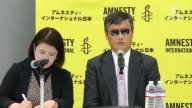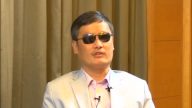【新唐人2012年5月7日讯】中国盲人维权人士陈光诚获准前往美国后,他就医的“北京朝阳医院”仍然被大批警察便衣严密监控,前往看望陈光诚的多名异议人士和访民遭到殴打或带走。5月6号,有香港媒体人士在试图接近医院采访时,被没收驻站证和回乡证。按照美中新达成的协议:陈光诚将携带家属去美国。不过中共的承诺是否足以保证陈光诚一家顺利办好签证到达美国,还有待观察。
美国“纽约大学”5月5号已经证实,邀请陈光诚到“纽约大学”担任访问学者。活动人士说,对中共表示允许陈光诚出国,必须谨慎看待,当局可能会拖拖拉拉办理出境手续。
按照相关规定,申请护照需要15个工作日,加急处理则需5个工作日。
另外,陈光诚及家人如果要回山东临沂家乡,向早前他指控暴力对待的公安部门办理护照,恐怕会受到当地公安百般刁难。加上美中双方之前并没有讨论他能否回国等问题,外界认为,陈光诚安全离开中国还障碍重重。
独立中国问题专家巩胜利:“其实如果他(陈光诚)在国内能够继续他的生存环境,这比任何都重要,这不仅是他一个人,而是中国除了是政党的8千万以外,12.2亿人口都是这样的环境。我觉得陈光诚(事件)是中国‘人治’的一种结果,这种结果往前看,从六四以来,多少人都是这样放出去的,再从后看,如果中国不发生法律环境的变化,可能中国这样的事件是常态。”
美国官员披露,刚刚离开北京的美国国务卿克林顿在美中达成的新协议中,扮演重要角色,但有关内容目前不得而知。BBC在北京的记者说,现在克林顿走了,陈光诚仍然停留在“和监狱差别不大”的医院。治安人员不准任何人探望陈光诚,所谓“陈光诚戏剧”并没有结束。
而连日来,探望陈光诚的朋友和访民遭到殴打和传唤。其中维权律师江天勇的耳朵被打聋,艾未未的助手刘艳萍被北京国保带走传唤9小时。
5月5号中午,100多名访民聚集在“朝阳医院”外围观陈光诚,被警方盘查并拍照,还有访民被抓走。5月6号,香港有线电视的媒体人士试图接近医院采访时,被没收回乡证和驻站证。陈光诚说,即使美国大使馆人员也不能获准每天进入病房探望他。
著名独立中国问题专家,财经、社会类评论家巩胜利认为,“陈光诚事件”反映了所谓“中国特色”的中共体制,与全球法制国家之间的冲突。
巩胜利:“作为美国的国务卿,她应该从联合国宪章,从联合国人权方面来提这个问题,可能更真实一些,也可能更具体一些。因为中国对联合国的包括人权,还有三个公约,大家都知道中国没有实施,也没有认可。”
有活动人士担心,“陈光诚事件”发生后,地方官员对管辖范围内的异议人士可能会加紧监督、管制,防止他们模仿陈光诚逃往外国使馆。律师张赞宁在分析其中原因时指出,因为中国明显存在两个中央,两个不同的声音,如果是“政法委那个中央”权力还是没有削弱的话,肯定要加强对维权人士的管制。
采访/朱智善 编辑/许旻 后制/葛雷
*****************************
Human Rights Deal in Difficulty, Chen Guangcheng’s US Travel Encounters Obstacles
Blind activist Chen Guangcheng was given permission to study
in the U.S., but many plain-clothes police still surround Beijing Chaoyang hospital where he is being treated.
Many dissidents who came to visit Chen were beaten
and detained.
On May 6, Hong Kong reporters tried to enter the hospital
to interview Chen, but their China re-entry and reporting certifications were confiscated.
According to the Sino-US agreement, Chen will be
accompanied by his family to America.
However, only time can tell whether the Chinese Communist
Party’s (CCP) promise ensures a smooth processing of Chen and his family’s visa application.
On May 5, New York University confirmed a fellowship offer.
Activists said that the CCP has allowed Chen to go abroad.
It must be cautious about what CCP has said because they may
deliberately delay Chen’s application.
According to the rule, it will take 15 working days to approve
the passport request. Express service will take 5 working days.
If Chen and his family apply for passports in his hometown
of Linyi, Shandong, the local police that Chen has exposed as abusers, could make it difficult.
In addition, during the Sino-US meeting, the issue of Chen’s
return to China in the future was not discussed.
Outsiders believe Chen’s safe departure from China
will encounter many obstacles.
Gong Shengli, an independent China expert: “If Chen can
live in China, it is very important, as his living environment is not an individual case.
Apart from the CCP’s 80 million members, 1.22 billion
Chinese people live in a similar environment.
The Chen’s incident is the result of CCP’s “rule of man.”
Looking back, since June 4, 1989,
many dissidents left China in a similar way.
Looking ahead, without changing the legislative system,
such incidents will be common place.”
U.S. officials disclosed that the Secretary of State, Hillary
Clinton, was a key person in the new Sino-US agreement.
The details of the agreement haven’t been publicized yet.
A BBC reporter in Beijing said that Clinton left, but Chen
is still in the hospital, which is not much different than a jail.
Security guards haven’t allowed anyone to visit Chen,
and the so-called “Chen drama” has not ended yet.
Recently, dissidents and petitioners who visited Chen
were beaten and summoned.
Activist lawyer, Jiang Tianyong’s ears were beaten,
causing him to go deaf,
and Ai Weiwei’s assistant was taken away by Beijing
National Security personnel for nine hours.
On the afternoon of May 5, police interrogated and took
photos of over 100 petitioners outside Chaoyang Hospital supporting Chen, and some petitioners were taken away.
On May 6, Hong Kong Cable Television’s reporters attempted
to enter the hospital to interview Chen,
but their China re-entry and reporting certifications
were confiscated.
Chen said even US embassy officials weren’t allowed
to enter Chen’s room any day.
Commentator Gong Shengli believes that the Chen incident
reflects the conflicts between the so-called “China’s
characteristics” CCP system, and countries with lawful
systems in the world.
Gong Shengli: “Being a Secretary of State, she (Hilary
Clinton) should raise the issue according to United Nations
Charter and UN human rights convention, this would be more
practical and realistic.
As we all know, China didn’t fulfill and recognize the human
rights and three conventions.”
Activists are concerned that after the Chen incident,
local officials will intensify control and monitoring of dissidents
to avoid them copying Chen by fleeing to the U.S. embassy.
Lawyer Zhang Zanning points out that China obviously has
“two centers, two different voices.”
If this one “center," the Political and Legislative Affairs
Committee’s, power hasn’t been reduced; it will certainly strengthen activists’ control.





















